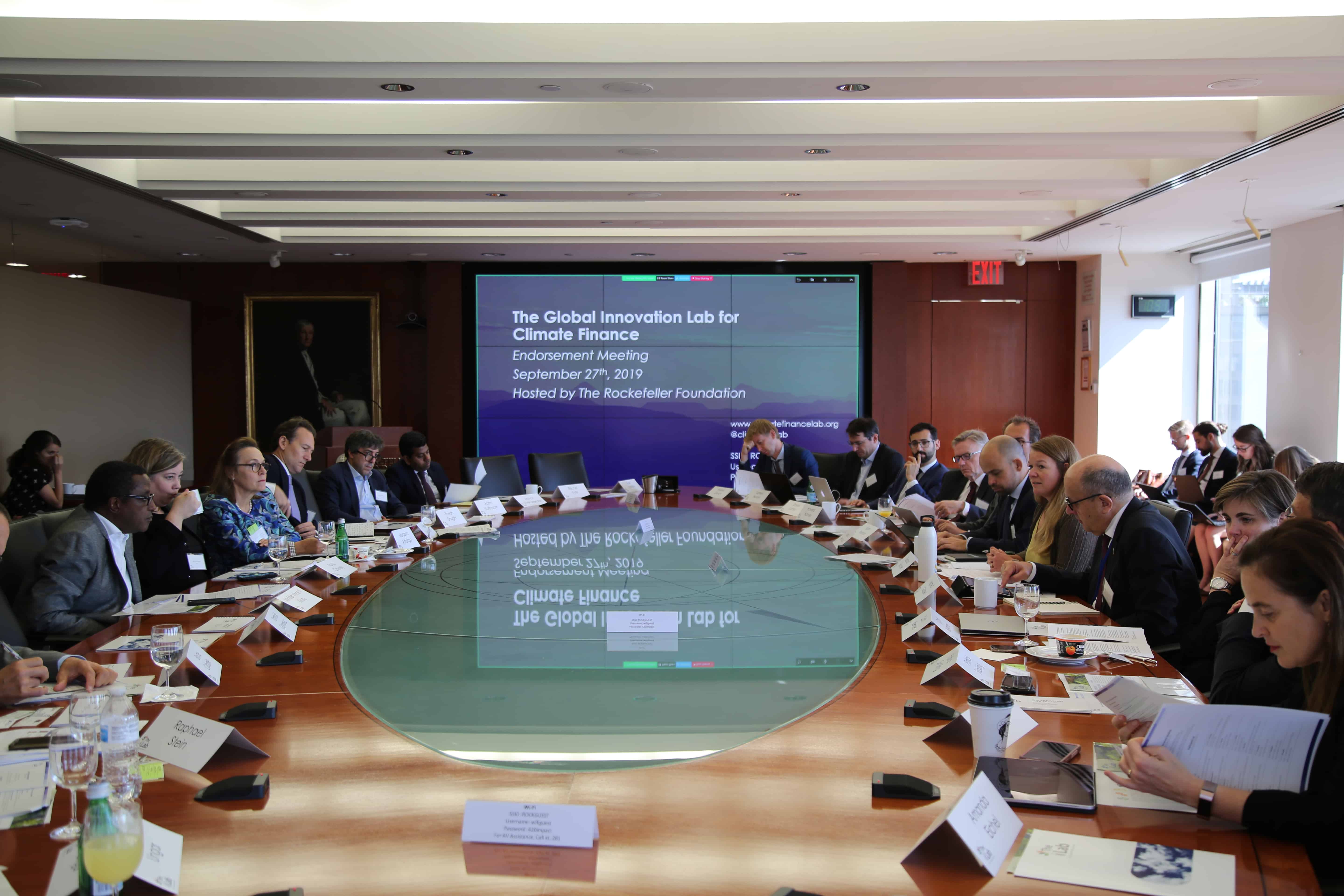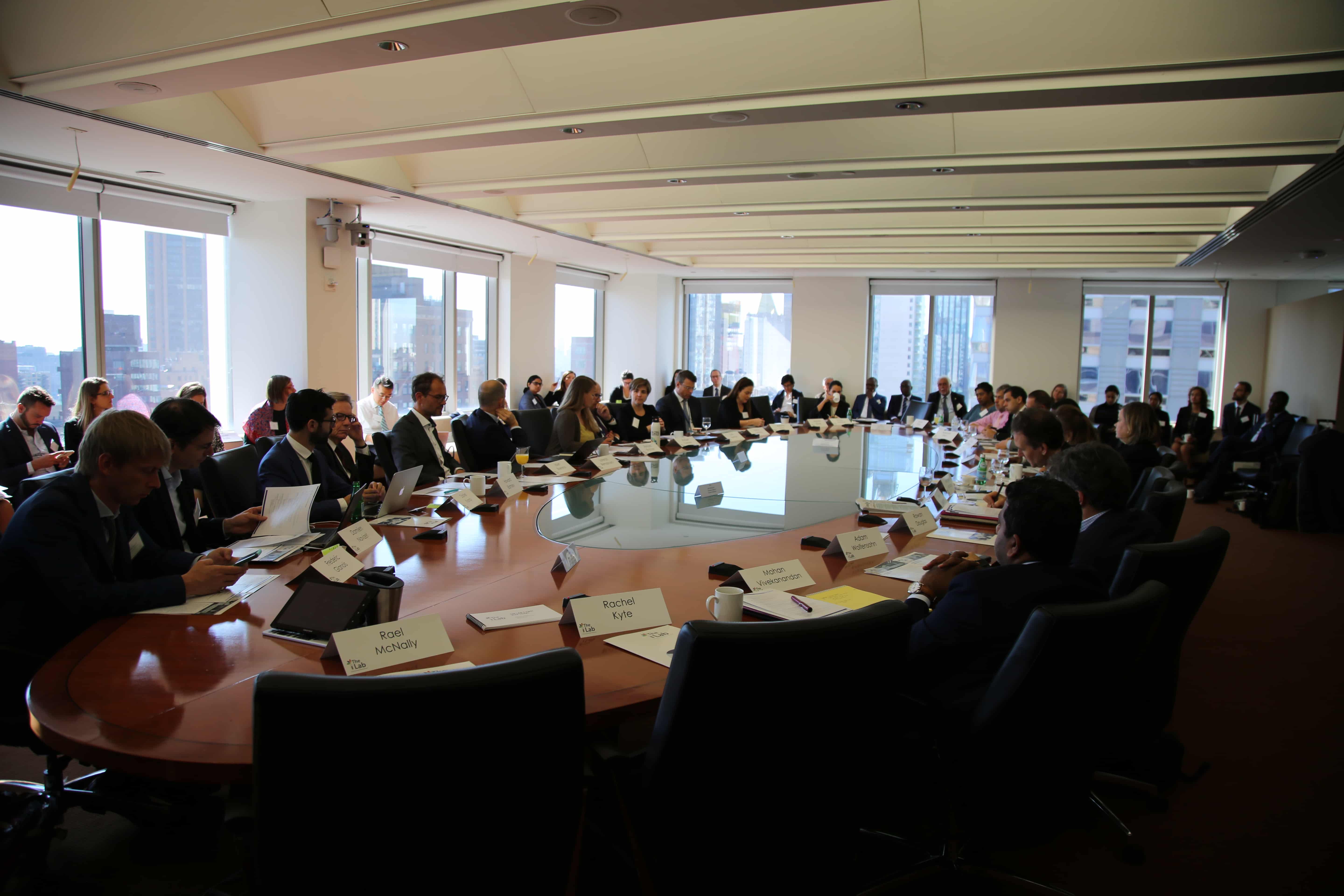New York, 2 Oct 2019 – Today, the Global Innovation Lab for Climate Finance announced the endorsement and launch of six innovative financial instruments for climate-related projects in developing countries.
The Lab, an initiative of over 60 public and private investors and institutions, accelerates much-needed investment solutions to support developing countries to meet their climate change and sustainable development goals. Created in 2014, the Lab has now launched 41 instruments that have collectively mobilized nearly US$ 2 billion for action on climate change and sustainable development.
The Lab member institutions met last week at The Rockefeller Foundation in New York on the margins of the UNSG Climate Action Summit. Lab members voted to endorse all six financial mechanisms and enterprises in the Lab’s 2019 class, officially launching them for operation, and offering inputs for their implementation pathways.
The solutions target four focus areas in climate mitigation and adaptation: blue carbon in marine and coastal ecosystems; sustainable agriculture for smallholder farmers in Africa; sustainable energy access; and sustainable cities. After going through a 7-month period of analysis, stress-testing, and design, the six instruments are ready to launch their pilots and have the potential to drive significant investment for sustainable development.
BLUE CARBON IN MARINE AND COASTAL ECOSYSTEMS
- Restoration Insurance Service Company (RISCO) is a social enterprise that invests in mangrove conservation and restoration in areas with high-value coastal assets, protecting blue carbon and reducing coastal flooding and property damage risk. Insurance companies will pay an annual fee for these services and blue carbon credits will be sold. The initial pilot project will protect 4,000 hectares of mangrove forest in the Philippines. At scale, RISCO has the potential to achieve avoided emissions and sequestration of 16 million tonnes of CO2, equivalent to the annual electricity use of over 2 million homes. Led by Conservation International.
SUSTAINABLE AGRICULTURE FOR SMALLHOLDERS IN WEST AND CENTRAL AFRICA
- Blockchain Climate Risk Crop Insurance is a standardized, digital index insurance platform for smallholder farmers in sub-Saharan Africa that increases resilience in the face of climate change and extreme weather events. It increases access to crop insurance by making the instrument more available and scalable through standardization and by increasing demand through lower premiums, and faster and more transparent payouts. The pilot targets 1.2 million farmers in Kenya. Led by Sprout Insure.
- The West African Initiative for Climate Smart Agriculture is a blended finance fund to support the uptake of climate-smart agriculture by providing technical assistance and subsidized-rate loans or guarantees to smallholder farmers in West Africa. At scale, it has the potential to reach 90,000 smallholder farming households, and convert 185,000 hectares to climate-smart agricultural lands. Led by the Economic Community of West African States (ECOWAS), which has already pledged US$ 16 million to the fund, and to be implemented by the ECOWAS Bank for Investment and Development (EBID), which has pledged US$ 10 million to the fund.
SUSTAINABLE CITIES
- Cooling as a Service aims to decrease energy consumption and greenhouse gas emissions from cooling use in cities through a pay-per-service model for more efficient cooling systems. The model could save customers more than 20% in lifetime spending on cooling equipment and could provide up to 30% more profit for technology providers than the sale and operation of low-efficiency cooling systems. CaaS is led by Basel Agency for Sustainable Energy (BASE) and the Kigali Cooling Efficiency Program (K-CEP), who have made significant progress towards initial implementation in the Dominican Republic and Jamaica, and are pursuing three to four larger flagship implementation projects, likely including South Africa, India, and Mexico.
- The Breathe Better Bond Initiative is a bond, paired with technical assistance, for city governments in developing countries to fund sustainable infrastructure projects that reduce both air pollution and greenhouse gas emissions. If just deployed in ten cities, it has the potential to mobilize over US$ 4 billion for sustainable infrastructure, significantly improve health related to air quality, and reduce CO2 emissions by an estimated 35 million tons, equivalent to removing 7.4 million cars from roads for a year. These numbers can grow significantly if the bond is deployed in 50 or more emerging market cities.
SUSTAINABLE ENERGY ACCESS
- Solar Securitization for Rwanda is a tradable solar asset-backed security that can accelerate the deployment of solar home systems in East Africa, by helping solar developers reduce their leverage and access capital for expansion. At scale, it can provide clean energy access to 2 million households in Rwanda and neighboring countries, translating into a US$ 100 million size instrument. Led by the Development Bank of Rwanda.
In mid-October, the Lab will open a call for ideas for next year’s cycle where it will be targeting ideas to drive investment for climate action in developing countries.
QUOTES FROM THE LAUNCH MEETING
Margarita Astralaga, Director of the Environment, Climate, Gender and Social Inclusion Division (ECG), International Fund for Agricultural Development (IFAD) – “IFAD has partnered with the Lab because we know how business solutions are important for addressing issues related to the increasing climate impacts on smallholder farmers and agriculture in Africa. The Lab’s innovative mechanisms show how big of an opportunity there is for the private sector to take a more central role in accelerating sustainable agriculture, particularly in West and Central Africa, home of many of the world’s fastest growing economies.”
Lorenzo Bernasconi, Managing Director, The Rockefeller Foundation – “Financial innovation will be crucial in accelerating clean energy access for the hundreds of millions who still lack a reliable source of electricity. The Lab is helping to develop and deploy marketable solutions to fill this gap, helping to overcome one of the greatest barriers to universal energy access.”
Barbara Buchner, Executive Director of Climate Policy Initiative, Lab Secretariat – “With the Lab’s support, these solutions are unlocking investment that can transform the economic reality toward greater sustainability in countries and regions that need it most. If in just five years the Lab has shown it can unlock billions of dollars in sustainable investment, we are ready to go from traction to scale and excited to see what the next five years will bring.”
Norbert Gorissen, Deputy Director General, International Policy, Federal Ministry for Environment, Nature Conservation, and Nuclear Safety, Germany – “It’s time for countries to translate their national climate plans into concrete investments. The new instruments endorsed by the Lab show great potential to open up new markets and opportunities for effective and ambitious action on climate change.”
Patrick Suckling, Ambassador for the Environment, Department of Foreign Affairs and Trade, Australia – “I’m pleased to see this innovative solution to the challenge of mobilising private finance for protecting coastal blue carbon ecosystems. I’m excited that the model has application in the Asia-Pacific region with international application. This is particularly important at a time when ocean health is increasingly recognised as under threat and international action is an imperative.”
Joëlla van Rijn, Coordinator of Climate Finance at the Netherlands Ministry of Foreign Affairs – “Financial instruments, such as the ones the Lab just launched, are capable of driving sustainable economic growth, thus improving the well-being of groups of people who are most vulnerable to climate change. These instruments fit very well in the Dutch integral strategy to mobilise private investment for SDGs. As a part of the Lab, we’re delighted to support the development of these high-impact market solutions for climate action.”
Antha Williams, Head of Environment, Bloomberg Philanthropies – “Sustainable investment is critical as we tackle the key global challenges of the 21st century – and the Lab is a leading force in successfully mobilizing investment to accelerate climate action. At Bloomberg Philanthropies, we support initiatives that bring to life Mike Bloomberg’s vision of harnessing data to ensure better, longer lives for the greatest number of people. The Lab embodies this mission, and we’re excited to watch as these innovative finance instruments help drive action on climate change and sustainable development.”
ABOUT THE LAB
The Global Innovation Lab for Climate Finance identifies, develops, and launches innovative finance instruments that can drive billions in private investment to action on climate change and sustainable development. The Lab is funded by the Australian Department of Foreign Affairs and Trade, Bloomberg Philanthropies, the German Federal Ministry for the Environment, Nature Conservation, and Nuclear Safety (BMU), GIZ, the International Fund for Agricultural Development (IFAD), the Netherlands Ministry for Foreign Affairs, The Rockefeller Foundation, Shakti Sustainable Energy Foundation, and the UK Department for Business, Energy & Industrial Strategy. Climate Policy Initiative serves as Secretariat.
CONTACT
Maggie Young
Senior Communications Associate
Climate Policy Initiative
maggie.young@cpisf.org

The Lab Endorsement Meeting 2019 at The Rockefeller Foundation, in New York. Photo: courtesy of the Ministry of Environment of Rwanda

Lab members convened to The Rockefeller Center, in New York, to launch the six climate finance instruments of the class of 2019. Photo: courtesy of the Ministry of Environment of Rwanda

